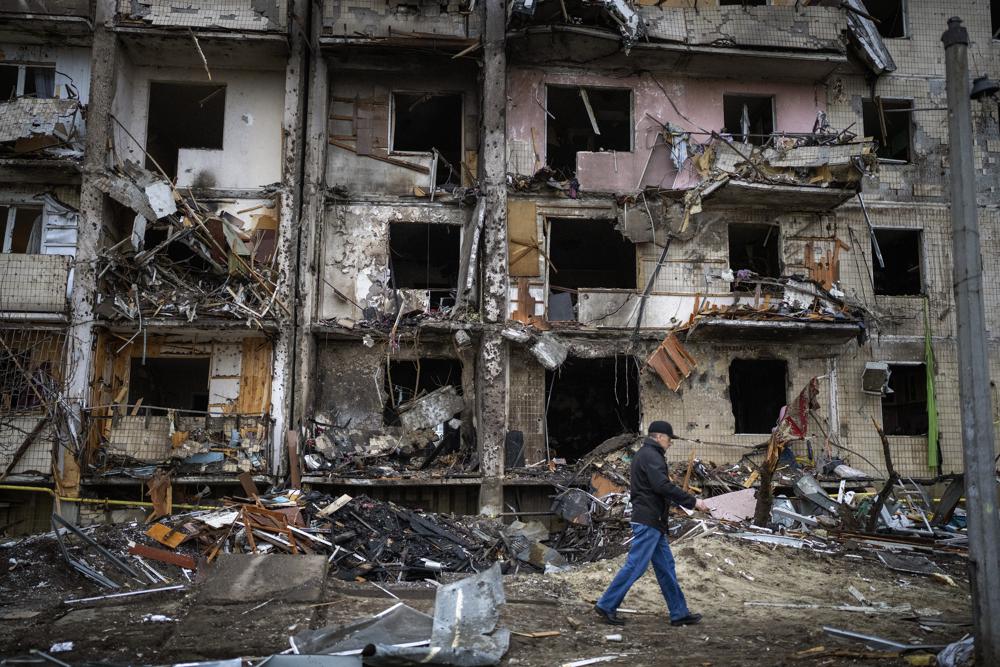Invading Russian forces closed in on Ukraine’s capital Friday, in what appeared to be an encircling movement after a barrage of airstrikes on cities and military bases around the country.
Pre-dawn explosions rocked Kyiv, and gunfire was reported in parts of the city, while Ukraine’s military said a group of Russian spies and saboteurs was seen on the capital’s outskirts. Police told people not to exit a central subway station because of gunfire in the area.
The assault, anticipated for weeks by the West, amounts to Europe’s largest ground conflict since World War II. It could also portend the emergence of a new “Iron Curtain” between the West and Russia, with global repercussions.
Ukrainian President Volodymyr Zelenskyy appealed for defense assistance and tougher sanctions on Russia. U.S. President Joe Biden was to meet Friday with fellow NATO leaders during a virtual summit.
Here are the things to know about the conflict and the security crisis in former Soviet-dominated Eastern Europe:
KREMLIN MULLS UKRAINE’S OFFER OF NEUTRALITY
The Kremlin said Friday that President Vladimir Putin was ready to send a delegation for talks to discuss Zelensky’s offer to designate Ukraine a non-aligned country. The offer suggests Zelenskyy would be willing to negotiate dropping his country’s bid to join NATO.
The Kremlin said Putin expressed his readiness for talks with Ukrainian officials to Chinese President Xi Jinping, who “views the Russian leadership’s action in the crisis situation with respect.”
According to the Kremlin, Putin and Xi agreed that the West has imposed “illegitimate” sanctions against Russia “for achieving selfish goals of certain countries.”
Before the invasion, the West had rejected Russia’s demand to keep Ukraine out of NATO. Putin used the refusal to justify the invasion, claiming that the West left him no other choice.
Russian Foreign Minister Sergey Lavrov accused Zelenskyy of “simply lying” about the non-alignment offer, saying the president “missed the opportunity” to discuss Ukraine’s neutral status when Putin initially proposed it.
CIVILIANS IN HARM’S WAY
As they awakened on the second day of Russia’s invasion, horrified civilians found themselves at risk as artillery shells rained down on some residential buildings on Kyiv’s outskirts.
Russia has said it is not targeting cities, but the fighting would seem to belie that. The body of a soldier lay on the ground near a Kyiv underpass. Elsewhere, fragments of a downed aircraft lay amid a residential area’s brick homes with black plastic covering body parts found nearby.
City residents stood uneasily in doorways of apartment buildings watching armored personnel carriers driving down the streets.
Ravina Shamdasani, a spokeswoman for the U.N. High Commissioner for Human Rights, says its staffers have so far verified at least 127 civilian casualties — 25 killed and 102 injured — mostly from shelling and airstrikes.
A spokeswoman for the U.N. refugee agency, Shabia Mantoo, said more than 100,000 people were believed to have left their homes in Ukraine and that “up to 4 million people may flee to other countries if the situation escalates.”
NUCLEAR WAR NIGHTMARE REVISITED
Reviving Cold War fears of a nuclear showdown, Russian President Vladimir Putin has warned in a speech that he has the weapons available if anyone dares to use military means to try to stop his takeover of Ukraine.
Whether an empty threat or not, Putin’s words re-animated the specter of nuclear war — through accident or miscalculation.
The Russian president said in a speech early Thursday that despite “losing a considerable part of its capabilities after the fall of the Soviet Union,” Russia remains “one of the most powerful nuclear states” and has “a certain advantage in several cutting-edge weapons.”
Putin’s mere reference to nuclear weapons has sent a jolt through the West about the possibility that the fighting in Ukraine might lead to a Russia-U.S. nuclear confrontation.
TURNING THE FINANCIAL SCREWS ON RUSSIA
The West has taken a military option in Ukraine off the table, but world leaders — with the exception of Moscow ally China — are preparing measures aimed at hurting the Russian economy and its leaders, including President Putin’s inner circle.
French President Emmanuel Macron said his country and its allies have decided to further sanction individuals, as well as impose penalties targeting finance, energy and other sectors.
Macron also said the EU has decided on an “unprecedented” 1.5 billion euros ($1.68 billion) in economic aid for Ukraine.
Among the penalties the European Union is considering is freezing the assets of Putin and his foreign minister. But it was unclear how badly they would be hit by such a move or if it would be mainly symbolic.
Luxembourg’s foreign minister, Jean Asselborn, said the EU was “very close to an agreement” on the asset freeze for Putin and Lavrov.
Asselborn said even further sanctions were still possible, including booting Russia off SWIFT, the dominant system for global financial transactions.
Asian and Pacific countries have joined the West in taking punitive measures against Russia, including export controls aimed at starving its industries and military of semiconductors and other high-tech products.
In retaliation to a British ban on Aeroflot flights, Russia’s civil aviation authority forbade U.K. flights to and over Russia starting Friday.
SPORTING WORLD TURNS ITS BACK
Russia has been stripped of hosting the Champions League final by UEFA w ith St. Petersburg replaced by Paris, and Formula One dropped this season’s Russian Grand Prix at Sochi.
The showpiece final in the European men’s football season will still be held on May 28 but at the 80,000-seat Stade de France after the decision by UEFA’s executive committee.
It followed discussions led by UEFA President Aleksander Ceferin that involved the European Commission and French President Emmanuel Macron after concerns over Russia retaining such a prestigious event in the wake of its invasion of Ukraine.
The F1 race wasn’t due until September but the motorsport series leadership decided it would be “impossible” to stage it there after talks with teams and the FIA governing body.
(AP)











